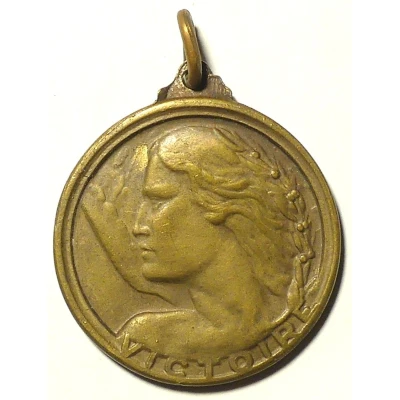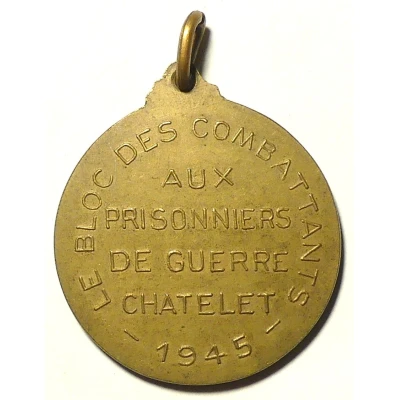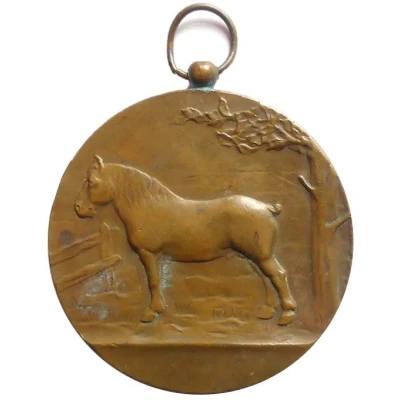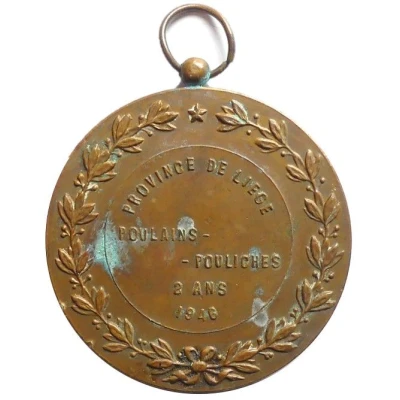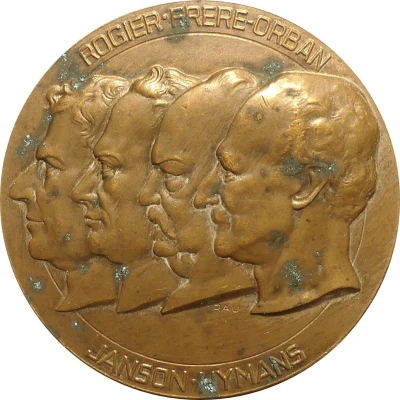
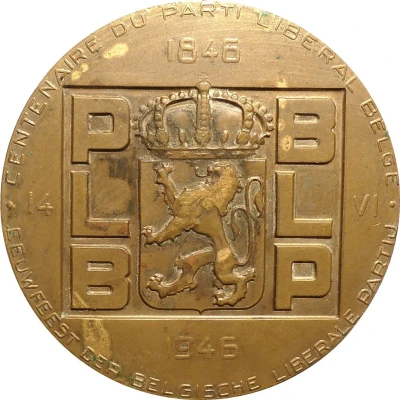

Medal - Centennary of the Belgian Liberal Party
1946 year| Bronze | 90.4 g | 60.11 mm |
| Location | Belgium |
|---|---|
| Type | Medals › Commemorative medals |
| Year | 1946 |
| Composition | Bronze |
| Weight | 90.4 g |
| Diameter | 60.11 mm |
| Thickness | 5.65 mm |
| Shape | Round |
| Orientation | Medal alignment ↑↑ |
| Updated | 2024-11-12 |
| Numista | N#431881 |
|---|---|
| Rarity index | 100% |
Reverse
In a central recessed frame, the crowned Belgian Lion with, on either side, the party acronym in French on the left and in Dutch on the right. The bilingual legend around it, in French above and Dutch below.
Script: Latin
Lettering:
• CENTENAIRE DU PARTI LIBERAL BELGE •
1846
14 PLB BLP VI
1946
EEUWFEEST DER BELGISCHE LIBERALE PARTIJ
Edge
Plain with inscription.
Script: Latin
Lettering: FISCH
Comment
The Liberal Party is a former left-liberal Belgian political party founded in 1846 and merged in 1961 with the Parti de la liberté et du progrès (unitary).
From the proclamation of the country's independence on October 4, 1830, it was, along with the Catholic Party, one of the two parties that dominated the country's political life.
However, it wasn't until 1846 that it organized itself and established its program at a founding congress at Brussels City Hall, under the presidency of Eugène Defacqz. Its members included Walthère Frère-Orban, Jules Bara, Pierre Van Humbeeck and Charles Sainctelette.
A platform for the urban bourgeoisie, this party attached particular importance to the independence of civil power from the clergy. Concerned with improving the situation of the working classes, it was perceived as a progressive formation, like the left of the time, as opposed to the Catholic and conservative right.
Between 1847 and 1884, it was the only rival party to the Catholic Party to either win an absolute majority of seats or find itself in opposition. In the elections of 1847, it won a major electoral victory following the lowering of the cens, and Charles Rogier took the helm of a cabinet that was soon dominated by Walthère Frère-Orban.
See more at https://fr.wikipedia.org/wiki/Parti_lib%C3%A9ral_(Belgium)
Charles Rogier, born in Saint-Quentin on August 17, 1800 and died in Saint-Josse-ten-Noode on May 27, 1885, was a liberal Belgian statesman, member of the National Congress, Freemason and Belgian revolutionary.
See more at https://fr.wikipedia.org/wiki/Charles_Rogier
Walthère Frère-Orban, born in Liège on April 24, 1812 and died in Brussels on January 2, 1896, was a Belgian liberal politician. He left his mark on the first half-century of Belgian independence. He was a Member of Parliament from 1847 to 1894, Minister of Finance from 1848 to 1852 and from 1857 to 1870, and Prime Minister on two occasions, the first from 1868 to 1870 and the second from 1878 to 1884.
See more at https://fr.wikipedia.org/wiki/Walth%C3%A8re_Fr%C3%A8re-Orban
Paul Janson (Herstal, April 11, 1840 - Brussels, April 19, 1913) was a Belgian liberal politician who wanted to introduce free compulsory schooling, military service and universal suffrage. After Paul Janson's death in 1913, Paul Hymans continued this commitment. In 1919, the first universal suffrage vote was held in 1921.
See more at https://fr.wikipedia.org/wiki/Paul_Janson#/media/Fichier:Janson_Paul_070518.jpg
Paul Louis Adrien Henri Hymans, born March 23, 1865 in Ixelles (Brussels) and died March 6, 1941 in Nice (Alpes-Maritimes), was a Belgian lawyer and politician, and a friend of Paul Janson. He was second President of the General Assembly of the League of Nations from 1920 to 1921 and again from 1932 to 1933, and was involved in colonial, electoral, military and educational issues. On the colonial question, he was one of the first to propose that Belgium take over the independent state of Congo. As early as 1911, Hymans advocated universal suffrage, pure and simple. On the question of education, he defended the liberal doctrine. The First World War turned him into a diplomat.
See more at https://fr.wikipedia.org/wiki/Paul_Hymans#/media/Fichier:Paul_Hymans_02.jpg
